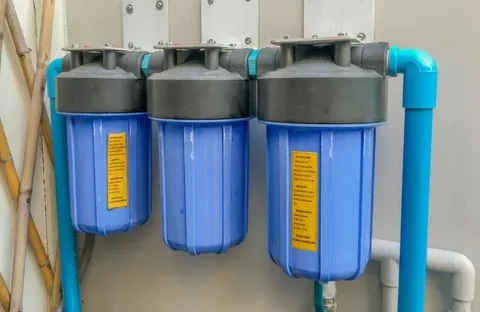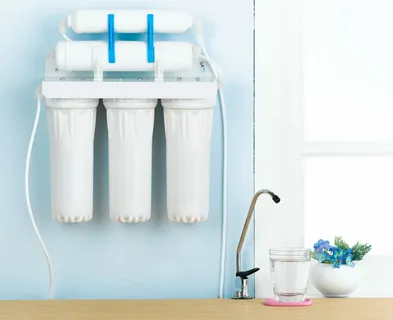Drinking water is one of the essential needs for survival, yet not all tap water is as clean as you may think. Although most municipal water sources in the United States are safe to drink, there are still countless pollutants that may be present. A water filter for home can provide an extra layer of protection and reassurance. This article will delve into why you should consider investing in a home water filter.
Understanding What’s in Your Tap Water
Despite the fact that our tap water undergoes treatment processes, it is not always 100% clean. Small traces of potentially harmful substances, such as lead and chlorine, can still slip through. Even organics or particulates may persist post-treatment. Moreover, our water’s journey from the treatment plant to our taps, through aging pipes and infrastructure, can also contribute to contamination. Old, corroded pipes can leach unwanted elements into our supposedly clean drinking water.
Hence, despite the treatments, the water reaching our homes may not be as pure as we assume. A home water filter, therefore, serves as an extra guard, aiding in the removal of these lingering impurities to provide safer, cleaner water for consumption. Investing in a quality water filter can effectively eliminate these concerns, ensuring your tap water is free from unwanted contaminants.
This not only improves the taste of your water but also helps protect your health. Additionally, certain types of filters can even strip out beneficial minerals like calcium and magnesium, so it’s crucial to choose a filter that only removes harmful contaminants. This way, you ensure you’re drinking not only cleaner but also healthier water. Considering this, selecting a water filter that balances removal of harmful contaminants while retaining essential minerals is key. Let’s explore different types of home water filters and their specific functionalities to help you make an informed choice.
Health Benefits of Using a Water Filter at Home
The advantages of using a water filter at home extend far beyond providing cleaner, more palatable water. Filtered water can offer notable health benefits by eradicating various contaminants.
For instance, the removal of lead, a toxic metal that can harm neurological functioning, ensures your drinking water doesn’t contribute to such damage. Similarly, filtering out chlorine, a disinfectant that can provoke digestive complications, contributes to a healthier gut. By eliminating these and other potential pollutants, a water filter can play a critical role in preserving and even enhancing the health and well-being of your household. Thus, investing in a water filter for your home goes beyond convenience or taste; it’s about safeguarding the health of those you care about most.
The filtration system doesn’t just stop at drinking water; it extends to water used in cooking, bathing, and cleaning, making it a holistic approach towards healthier living. By incorporating water filters in these daily activities, the potential risks linked with waterborne contaminants are substantially reduced. Beyond that, with water filters installed, you are essentially limiting the harmful effects of these contaminants not just on human health, but also on the environment.
Indeed, less plastic waste from bottled water means a healthier planet for all. Moreover, by reducing our dependence on commercially packaged water, we also decrease the energy used and greenhouse gas emissions involved in the manufacturing and distribution processes. Hence, opting for filtered water at home is not only a health-conscious decision, but also an eco-friendly one.
 Economical Aspects of a Home Water Filter
Economical Aspects of a Home Water Filter
While there is an initial expenditure involved in purchasing a home water filter, the potential long-term savings make it an economically sound decision. If you compare the one-time cost of a water filter to the ongoing expense of buying bottled water, you’ll find that a water filter becomes cost-effective over time. Not to mention, the hidden costs that may arise from potential health issues due to consuming unfiltered water.
A water filter can help mitigate these health-related costs by providing you with safer drinking water. Therefore, despite the upfront investment, the cumulative savings of using a water filter can make it a financially beneficial choice in the long run. Remember, it’s not just about the cost; it’s about the value and peace of mind that a water filter can offer in terms of health protection for your family. Indeed, by investing in a water filter, you’re not only saving money in the long run but also making a crucial investment in your family’s wellbeing.
Hence, it is safe to assert that a water filter for home is both a prudent economic and health decision. Moreover, given the increasing concern over water pollution and contamination, installing a home water filter ensures a consistent supply of clean water, negating the need to rely on unpredictable external sources. It’s a practical solution that balances both fiscal responsibility and health consciousness.
Environmental Advantages of Using a Water Filter
Opting for a home water filter system can have a profound impact on our environment. It significantly lessens the dependence on bottled water, an industry notorious for its contribution to plastic pollution. Plastic bottles take centuries to biodegrade, littering our landscapes, clogging our waterways, and endangering wildlife.
Every bottle of water you don’t buy is one less piece of plastic in our world. Additionally, the production and transportation of bottled water use considerable amounts of fossil fuels, contributing to greenhouse gas emissions. By choosing to filter your own tap water, you’re reducing your individual carbon footprint, which, collectively, can make a significant difference. Filtering water at home isn’t just a step towards healthier living; it’s a stride towards a healthier planet. So, while ensuring clean, safe water for your family, you’re also doing your bit for the environment.
A home water filter, therefore, holds a dual promise – of personal health and environmental sustainability. This effective solution not only caters to your hydration needs but also helps in preserving our planet. Thus, investing in a water filter system is an action towards conscious living and responsible consumption.
Enhancing the Taste of Water with a Filter
One of the notable benefits of using a home water filter is its effect on the taste of your water. Chlorine and various other chemicals that are often present in tap water can produce an unpleasant taste. When you utilize a water filter, these undesired elements are removed, leading to a significant improvement in the flavor of your water. Not only will you be sipping on cleaner, safer water, but you’ll also be enjoying a fresher taste with each gulp. This makes filtered water a more appealing option for daily consumption, encouraging better hydration habits.
Imagine pouring a glass of water from your tap and tasting the crisp, pure flavor of fresh water each time. With a water filter, this can be your everyday reality. So, in addition to the health, economic, and environmental advantages, a water filter also brings a tastier drinking experience into your home. And when your drinking water tastes better, you naturally want to drink more of it, promoting healthier hydration practices. It’s a simple yet impactful change that your entire family can enjoy and benefit from.
Types of Water Filters and Their Specific Use
The market offers an array of water filters, each designed with unique features to tackle different kinds of contaminants. Activated carbon filters are popular for their ability to remove organic compounds, chlorine, and improve the taste and odor of water. Reverse osmosis filters are well-regarded for their capability to eliminate a wider range of impurities, such as lead, fluoride, and other dissolved inorganics.
For those concerned with microbiological contaminants, UV filters are a superior choice, as they use ultraviolet light to kill bacteria, viruses, and other pathogens. In addition to these, there are also ion exchange filters, mechanical filters, and more. It’s essential to assess your water quality, understand the possible contaminants, and then select a filter designed to deal with those specific issues. Remember, not all filters are created equal, and the best choice for you will depend on your individual water situation and the contaminants you are most concerned about.
Purifying Your Water: How Water Filters Work
Water filters operate by harnessing both physical and chemical processes to filter out undesirable impurities. As tap water travels through the filter system, the contaminants become trapped within the filter media. This media can vary depending on the type of filter used. For example, activated carbon filters attract and hold certain chemicals, while mechanical filters physically strain out particles.
On the other hand, UV filters utilize ultraviolet light to neutralize harmful microorganisms. Regardless of the specific method used, the outcome remains the same: the potentially harmful substances are prevented from flowing through, while clean, purified water is allowed to pass. This process enhances the safety and taste profile of your water, contributing to a healthier and more enjoyable drinking experience.
Choosing the Right Water Filter for Home
When selecting a water filter for home, several factors should be taken into account. A preliminary assessment of the quality of your local tap water is essential. Research or get a water quality report to understand the nature and concentration of contaminants present. This information can help you choose a filter that’s effective against those specific pollutants. For example, if your water supply has a high lead content, a reverse osmosis filter may be your best bet. Your budget is another important consideration.
While initial costs for some filters may be higher, the long-term savings and health benefits can outweigh these. You should also factor in the ease of installation and maintenance requirements. Finally, consider your family’s needs and lifestyle. If you travel often, a portable filter might be more suitable. Or, if you have a large family, a whole-house filter system might be the ideal solution. By carefully evaluating these factors, you can choose a water filter that meets your specific needs and provides your home with safer, tastier water.
FAQs
Is professional installation needed for a water filter?
The necessity for professional installation varies among water filters. Some systems can be easily installed by homeowners, while others might require expert assistance.
How frequently should my water filter be replaced?
The recommended replacement frequency for water filters depends on the type of filter and the guidelines provided by the manufacturer. Generally, it’s advisable to change most water filters approximately every half a year.
Is investing in a water filter worthwhile?
Taking into account the significant health, economic, and environmental benefits provided by a home water filter, many experts concur that it’s a sensible investment.
Conclusion
Investing in a home water filter serves as a critical safeguard for your family’s health, financial savings, and the environment. It provides a layer of protection against potential contaminants that might escape conventional water treatment processes. This results in cleaner, safer, and tastier water for daily consumption, boosting overall well-being and promoting better hydration habits. Economically, despite the initial outlay, a water filter proves to be cost-effective in the long run, especially when compared to the continued purchase of bottled water. Furthermore, it positively impacts the environment by reducing plastic pollution and carbon footprint associated with the production and transportation of bottled water.
| Other Good Articles to Read |
| Niche Blogs Connect |
| Blogs 97 |
| Blog Stitution |
| Blogs Unplugged |
| Blogs Cotch Rouge |
| Blog Signatr |
| Blog Sintonias |
| Blog Zilla |
| Consumer Forums |
| Finance Forums |
| G Blogs |
| Too Blog |
| Related Business Listings |
| Contact Directory |
| Local Business Profiles |

